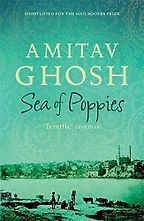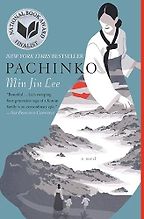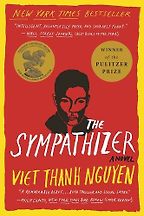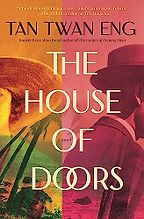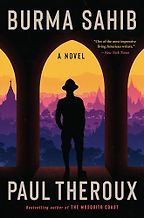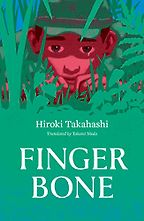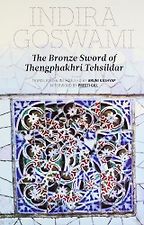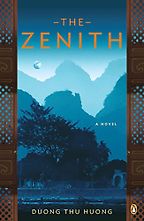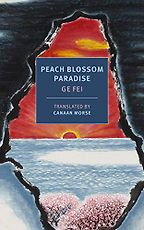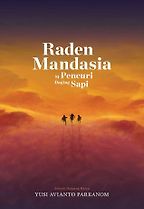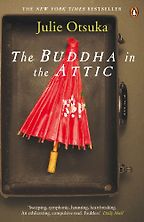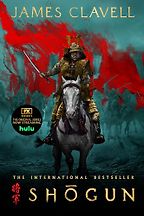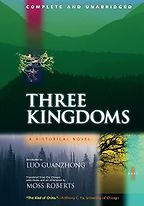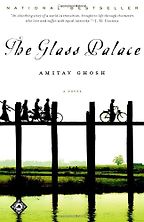Historical Fiction set in Asia
Last updated: February 02, 2025
The history, culture and geography of Asia is a perfect backdrop for gripping historical fiction. Here is our collection of expert recommended historical fiction set in Asian locations, including Jing-Jing Lee's How We Disappeared—a historical novel about the Japanese occupation of Singapore—and Amitav Ghosh's The Glass Palace, which follows the life of the last Burmese king and his family.
Sea of Poppies
by Amitav Ghosh
Sea of Poppies is book one of Indian author Amitav Ghosh’s Ibis trilogy and was shortlisted for the Booker Prize. Ibis is the name of an old slaving ship which is a key part of the story (though by no means all the action is set there). The other books in the trilogy are River of Smoke (recommended by economic historian Emma Rothschild) and Flood of Fire.
“This book tells a story that we don’t often hear, which is about the opium trade and what it did to India, notably to the part of India I come from, Bihar. Why was India even important to the British or the East India Company? It was because of the opium more than anything else. It profoundly changed India, reaching deep into the economy of rural India. Till opium became their biggest trading item, the British didn’t really touch rural India. I learnt this thanks to Amitav Ghosh. The trilogy is about a group of people who have become indentured laborers on an opium ship. The three books follow loosely the lives of about five or six of the characters on that ship…It’s difficult to say what is the best thing about these three books. First, it’s the attention to historic detail. Second, the characters, and third, the attention to language and how it has morphed and died through time – Chinese-English, Laskari, colonial English. There are times in the book when your blood boils at the horrors of colonialism. And there are other times when you just think, ‘The human spirit is unbelievable, that people could survive such cruelty and exploitation and still come out on top with their humanity intact.'” Read more...
Radhika Jha, Novelist
“I love the way that Lee weaves the story, so you are taken from this incredibly poor area of Korea to Japan, who was the colonizing power. The Koreans were regarded as dirt in Japan. They were nothing. They occupied these incredibly poor ghetto areas of Osaka. There was no work for them, and they had to endure horrific bureaucracy and being carded everywhere. They couldn’t do anything, and they couldn’t be anything without the backing of rich Japanese people. The only jobs that any of them could get were in the pachinko parlors. Pachinko is this gambling pinball machine which, apparently, is a big part of the culture in Korea. There were parlors everywhere, and the Koreans worked in them, and all the poor Koreans would go and lose their money in them. It’s what kept the entire Korean economy going in Japan. It’s quite extraordinary. It was fascinating because it was a window onto a world that I knew absolutely nothing about. She made me care. I wanted to know what happens to the characters. When someone dies, it’s so heartrending. You think, ‘That’s not right. You can’t do that!’ But it’s life, and it’s what happens.” Read more...
Historical Fiction Set Around the World
Jane Johnson, Historical Novelist
“Viet Thanh Nguyen is a powerful new voice for the Vietnamese who left the country after the end of the war in 1975, mainly South Vietnamese who fled after the fall of Saigon in 1975 and settled in the US. The protagonist is half French, half Vietnamese. He’s a spy working undercover for the communists in Saigon and then in the US. When he returns to post-war communist Vietnam, he is imprisoned by his own side. The novel ends at sea with the narrator leaving Vietnam among a crowd of boat people. Viet Thanh Nguyen illustrates the complexity of divided loyalties that come from Vietnam’s history—from being a colony for 100 years, then at war for over 30 years, with families split between supporters of the North and supporters of the South.” Read more...
Sherry Buchanan, Journalist
The House of Doors
by Tan Twan Eng
☆ Longlisted for the 2023 Booker Prize
The House of Doors is another beautiful historical novel by Malaysian novelist Tan Twan Eng. Set in Penang, it's told through the eyes of two people: Lesley Hamlyn, a Malaysian-born English woman married to a lawyer and the British novelist W. Somerset Maugham (Willie). It's a wonderful fusion of fact and fiction, featuring also Sun Yat-sen—the Chinese revolutionary who served as the first president of the Republic of China. Sun Wen, as he liked to be called, spent time in Penang in 1910.
“There are a lot of different strands to this novel, one of which is secrets. But it’s also about memory and loss, and the stories we tell to ourselves and to others. Set in 1921 in the Straits Settlements of Penang, we have Somerset Maugham and his lover coming to stay with the Hamlyns: Robert Hamlyn, a lawyer, and his wife Lesley a society hostess. The visit is uneasy. Everybody has secrets, and Somerset Maugham was notoriously good at persuading people to share them, and then, barely disguising the characters, using the stories to his own authorial advantage. With great artistry, Tan Twan Eng shows us how the unravelling of secrets leads to other stories.” Read more...
The Best Historical Fiction of 2024
Katharine Grant, Historical Novelist
Burma Sahib
by Paul Theroux
Travel writer Paul Theroux imagines the life of British writer George Orwell, during the period he spent as a colonial policeman in Burma (now Myanmar) in the 1920s. Orwell wrote about this period in his novel, Burmese Days, and some episodes from his essays appear in the book—though Theroux goes well beyond those to create a work of fiction. The book opens on the ship on the way out to Rangoon, with a woman spying on Orwell through a pair of binoculars as the Suez Canal recedes in the background. As a 19-year-old wearing an Eton tie, she thinks Orwell might make a good prospect for her daughter.
Finger Bone
by Hiroki Takahashi & Takami Nieda (translator)
🏆 Winner 2014 Shincho Prize for New Writers
Finger Bone was the debut novel of award-winning Japanese writer Hiroki Takahashi, first published in English in 2023. The title alone conveys a lot of its horror: rather than gravestones, when Japanese soldiers died in World War II, one finger would be chopped off, stripped of its flesh and sent home to the family. The novel is set in Papua Guinea in 1942, and details the experience of a young, wounded soldier in the Imperial Japanese Army. It's a short, very sad book.
The Bronze Sword of Tengphakhri Tehsildar
by Indira Goswami, translated by Aruni Kashyap
“This novel is Goswami’s last work of fiction. Set in late 19th century Assam, it follows the life of Thengphakhri, a Bodo freedom fighter who has been immortalized in Assamese folklore, songs, and stories. She was employed by the British colonial administration in the Bijni kingdom in lower Assam as a revenue or tax collector, the eponymous ‘tehsildar’—perhaps the first woman in that post. At that time, educated Indians and the British government were both trying to bring about reform in the country by working to eliminate patriarchal and misogynistic practices like sati, child marriage, the purdah system, etc. and encourage widow remarriage. Alongside all of that, we have this swashbuckling protagonist, where she’s boldly riding horses, wearing hats over flying knee-length black hair. Eventually, she rebels against the British” Read more...
The Best South Asian Novels in Translation
Jenny Bhatt, Translator
“It’s a historical novel that reads like a gripping political thriller. She takes on a controversial subject: the inner circle of Ho Chi Minh, president of North Vietnam from 1945 until his death in 1969, and hero of Vietnamese independence. He was beloved by millions in communist North Vietnam but vilified by the South. “ Read more...
Sherry Buchanan, Journalist
Peach Blossom Paradise
by Canaan Morse (translator) & Ge Fei
🏆 Shortlisted for the 2021 National Book Award for Translated Literature
Peach Blossom by Chinese novelist Ge Fei (real name: Liu Yong) is set at the time of China's Hundred Days' Reform in 1898 when it looked, briefly, as if China's Qing dynasty would embrace reform. The main protagonist is Xiumi, the daughter of a wealthy landowner and former government official.
“Peach Blossom Paradise, a brand new historical novel with fanciful elements by Ge Fei that is set close to 1900 as well.” Read more...
Jeffrey Wasserstrom, Historian
“How We Disappeared is a historical novel about the Japanese occupation of Singapore. It’s a sweeping epic and tells the tragic story of a young girl who gets taken as a comfort woman. This is an essential read. It’s a wonderful introduction to Singaporean literature and where Singaporean literature is headed. It’s incredibly beautifully written and very understated.” Read more...
Sharlene Teo, Novelist
“With ancient Indonesia as its setting, fuelled with Yusi’s explosive—verging to chaotic, unapologetic, humorous style of writing—I’m interested to see if this book will get translated. It would be an interesting and refreshing window to peek into the richness of Indonesian literature.” Read more...
The Best Contemporary Indonesian Literature
Dee Lestari, Musicians, Music Critics & Scholar
“Julie Otsuka’s novel is an amazing first-person plural account of the mass migration of what were called Japanese ‘picture brides’ in the years leading up to, and during, World War II.” Read more...
The Best Transnational Literature
Mohsin Hamid, Novelist
“This is the story of a guy and a girl from different ethnic and religious groups falling in love, and the surroundings give this depth. Tbilisi now seems completely Georgian, but 100 years ago there were more Armenians than Georgians.” Read more...
The best books on Georgia and the Caucasus
Per Gahrton, Politician
Shōgun
by James Clavell
Shōgun, a 10-part mini-series, started streaming on Disney+ on February 27th, 2024. It’s excellent so far (and a big improvement on the 1980 mini-series)
“I was 15, I think, when I read it. I couldn’t believe that no one had ever written other books like it. I remember going to my English master at school and saying ‘What else is like this? I want to read more books like this!’ I can’t remember what he recommended, but I can remember picking them up and thinking they were nothing like Shogun. I was so entranced by the world of the 16th century he created that I’ve really had a fascination for it all my life.” Read more...
The best books on Life in the Tudor Era
Ian Mortimer, Historian
Three Kingdoms: A Historical Novel
by Luo Guanzhong & Moss Roberts (translator)
The Three Kingdoms was written during the early/middle years of the Ming dynasty (1368-1644), but chronicles events during the Han dynasty (168-280). Pictured is volume one of Moss Roberts’s translation of the Three Kingdoms. There is also an abridged edition, which is excellent (and still comes in at 400+ pages).
“You could say that its story is the story of all China, passed down from father to son. It is one of China’s four great classical novels, which also include the Journey to the West. But only with Romance of the Three Kingdoms did old Chinese stories really become Chinese literature. It’s also beautifully written. A reader can harvest a lot of history and knowledge from this book, because it chronicles all aspects of China. You can discover in it the entirety of the Chinese character, ancient and modern. All Chinese people today can find themselves in the Three Kingdoms, whether you are rich or poor, old or young.” Read more...
The Best Chinese Dissident Literature
Ma Jian, Novelist
“What I really liked about this novel is the way it describes an individual’s place in history. It’s not so much that Ghosh makes a judgement on whether we are agents or victims of history, but he explores the different ways in which individuals react to particular incidents, and how some manage to overcome adversity. The Glass Palace follows the life of the last Burmese king and his family. It begins shortly before the king was deposed and sent into exile by the British army.” Read more...
Ahmede Hussain, Journalist
